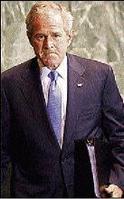
President Bush walks away from the podium after delivering remarks at the 63rd session of the United Nations General Assembly, yesterday, in New York. - Ap
WASHINGTON (AP):
The Bush administration urgently pressed Congress, in public and private, to move quickly on a $700 billion bailout of the financial industry yesterday as Democratic and Republican law-makers vented their anger over a crisis that pushed the United States (US) economy to the brink.
Stocks rose in the opening hour as Treasury Secretary Henry Paulson went before the Senate Banking Committee to say that quick passage of the administration's plan is "the single most effective thing we can do to help homeowners, the American people and stimulate our economy".
Unhappiness
But even before Paulson could speak, lawmakers expressed their unhappiness.
"We all recognise the gravity of the situation," said Senator Chris Dodd, a Democrat and the committee's chairman. He said a combination of "private greed and public regulatory neglect" had produced an "economic maelstrom".
Senator Richard C. Shelby, the panel's senior Republican, was even more blunt. "I have long opposed government bailouts for individuals and corporate American alike," he said. Seated a few feet (metres)away from Paulson and Ben Bernanke, the chairman of the Federal reserve, he added: "We have been given no credible assurances that this plan will work. We could very well spend $700 billion, or a trillion, and not resolve the crisis."
Dodd and other key Democrats have been in private negotiations with the administration, since the weekend, on legislation designed to allow the government to buy bad debts held by banks and other financial institutions. Key details remain unresolved, although the Democratic-controlled Congress is expected to vote in the next several days on a far-reaching measure.
Billion-dollar pause
The hearing unfolded as Vice-president Dick Cheney and Jim Nussle, the Bush administration's budget director, met privately with House Republicans. Some members of the party rank and file have expressed concerns about the bailout proposal, either because they view it as an unwarranted government intrusion into the financial markets, or because the $700 billion price tag gives them pause.
"Just because God created the world in seven days doesn't mean we have to pass this bill in seven days," said Rep. Joe Barton, a Republican.
Added Rep. Darrell Issa, a Republican: "I am emphatically against it."
Check executives
Despite the bipartisan unhappiness, the prospects for legislation seemed strong.
Differences remained, though, including a demand from many Democrats and some Republicans to strip executives at failing financial firms of lucrative "golden para-chutes" payments on their way out the door.
The administration is balking at another key Democratic demand, allowing judges to rewrite bankrupt homeowners' mortgages so they could avoid foreclosure.
The administration's plan is designed to let the government buy bad mortgages and other troubled assets held by endangered banks and financial institutions. Getting those debts off their books should bolster their balance sheets, making them more inclined to lend and easing one of the biggest choke points in the credit crisis. If the plan works, it should help lift a major weight off the sputtering economy.
Buttressing Paulson's comments, Bernanke said, in his prepared remarks, that action by lawmakers "is urgently required to stabilise the situation and avert what otherwise could be very serious consequences for our financial markets and for our economy".
So far this year, a dozen federally insured banks and thrifts have failed, compared with three last year. The country's largest thrift, Washington Mutual Inc., is faltering.

